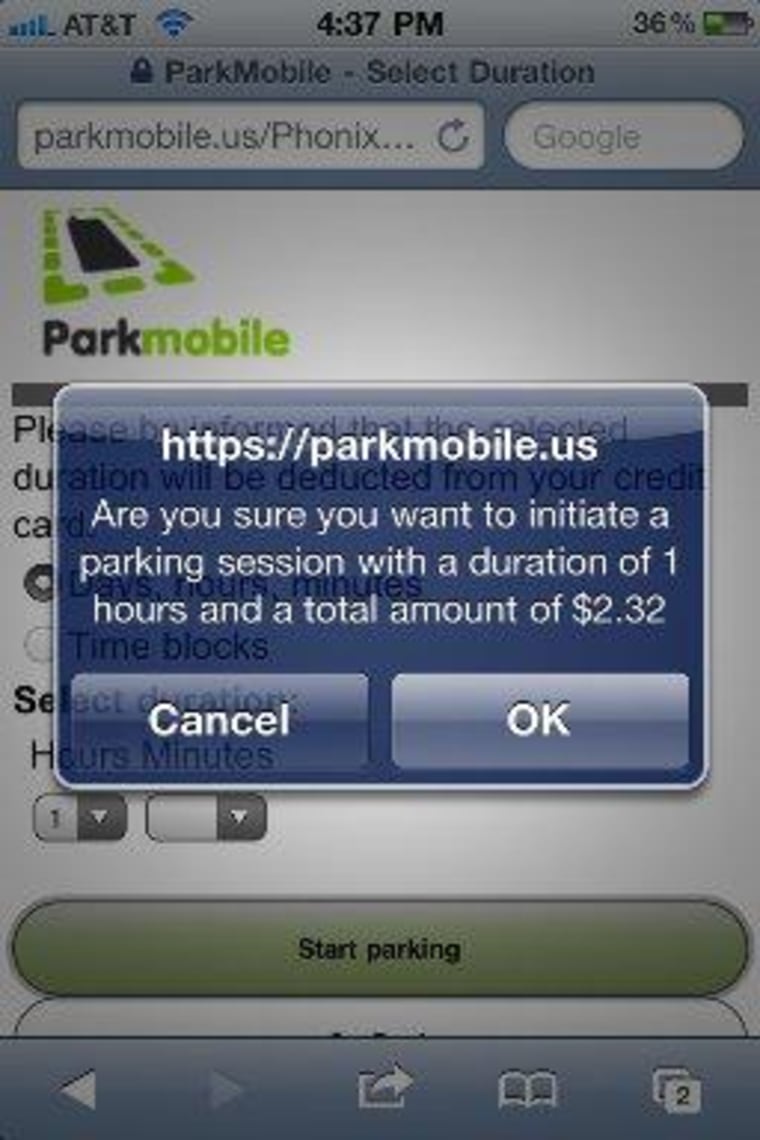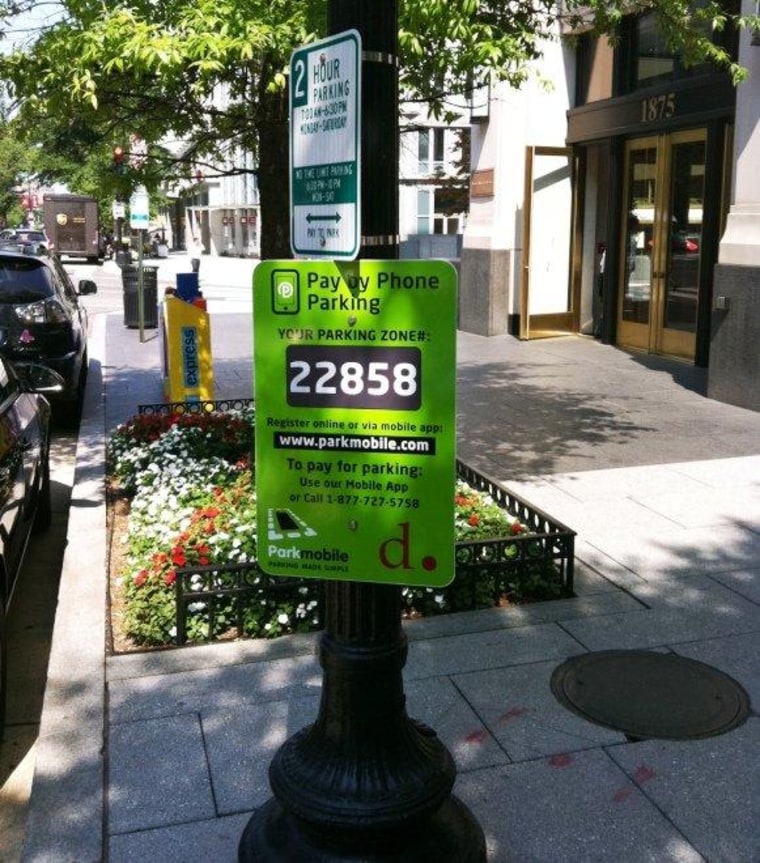Coin operated parking meters appear poised to go the way of the typewriter and the Sony Walkman, and parking in many American cities is about to get much easier. But like many modern conveniences, this advancement comes with a price -- more specifically, a fee -- and it raises thorny privacy questions.
No quarters? No problem. Beginning this month, drivers all over Washington, D.C., can simply phone in their payment for one of 17,000 city parking spaces, or use a smartphone app. The system, run by Atlanta-based Parkmobile, can even send you a text message when your time runs low, so you can hustle back to the car and beat the meter maid. If allowed, you can even pay for more parking time, right from the app, without leaving the restaurant or the store you're in.
San Francisco is experimenting with an even more ambitious system -- one that threatens to put a few good luck charms out of work -- that can tell drivers where the empty parking spots are, thanks to integrated curbside sensors.
"Mobile parking is indeed on the forefront," said Casey Jones, chairman of the International Parking Institute, based in Washington, D.C. "We are using technology to improve the whole parking experience."
Think of it as EZPass of parking. Mobile apps could someday end the need to pay for meter coin collectors -- and perhaps put meter maids out of work. And already drivers can pay without leaving their car seat, and without having to dig under the seats for spare change.
Two-year-old Parkmobile – owned by an Australian firm of the same name -- has contracts with more than 100 U.S. communities, including Boston, Chicago, and Atlanta. A new system is slated to come online in Portland next month. Verrus, which will operate PayByPhone in San Francisco, says it's in 85 cities, and collects payments for private parking lots in big cities like Seattle.
There have been other efforts to remove quarters from the parking equation, such as so-called multi-space meters used now in many jurisdictions. They are an imperfect solution, however. Drivers have to leave their car, trek to a centrally located machine, obtain a sticker, and then return to the car to stick it on the dashboard. Mobile parking has clear advantages.
Those advantages come at a cost, however. In D.C., parkers pay 35 cents each time they use the service; PayByPhone will get 45 cents per transaction from San Francisco drivers. That might sounds like a lot if you planned do just throw a quarter in a meter and drop off some mail, but places like Washington now charge up to $3 per hour at meters, making the fee seem more reasonable.
Jones, the parking institute official, thinks it's a small price to pay for a warning that your meter time is running short.
"For me to pay 35 cents, I wouldn’t care because I don’t want a ticket,” he said. “When people start to use this and get that benefit, it’s a little insurance policy for a small fee, I think they'll agree. … Let’s say I buy an hour but my meeting runs long. I get a text that says the meter about to expire. That in and of itself will alleviate a ton of frustration, the ability to say, ‘I don't have to panic and rush out of the meeting.’”
Mobile parking offers another advantage: It takes the guesswork out of how much time to pay for when you park. Thanks to the text reminders, drivers can pay for only the time they need. Multi-space meter users tend to buy the maximum allowable time -- and the machines are designed to encourage that -- to minimize ticket risks.
Of course, any system that can tell you when your parking time is about to expire could theoretically inform local law enforcement of the same thing. Anyone who's ever received a ticket for being 1 or 2 minutes overtime could imagine the glee an eager meter maid might feel at such an automated system.
Dyer swears Parkmobile doesn't have such a system, and it won't. ("We are a service trying to make people's experience better," she said.) Jones said the notion of such gleeful parking enforcement officers is a myth (even though enterprising New York Times reporters have proven such people do exist, at least in New York).
Similar systems in other parts of the world are routinely used as a law enforcement tools. Canadian cities have indicated their mobile parking tools help with over a dozen law enforcement actions.
“We have programs that let police check not only parking status but permits and whether the car is properly insured, stolen, etc.,” Naomi Omessi, a marketing executive at CelloPark Israel, bragged to the Toronto Globe and Mail recently.

U.S. privacy expert Larry Ponemon, head of the Ponemon Institute, has plenty of misgivings about a technology that forces citizens to routinely declare where they are and how long they'll be there.
"When I think about this technology, it does have a creepiness factor," he said. "Your car is an extension of you. Where you park may be information that would be very useful to someone who wanted to use it for negative purposes."
It's easy to imagine the data being sold and used for marketing, for example -- a nearby coffee shop could beam a coupon to your phone as soon as you climb out of your car. The data could be used by prosecutors as evidence that you were near a crime location, and it could be subpoenaed by lawyers in civil cases, as EZPass information has been.
And it's easy to conjure up even more disturbing scenarios. Who needs a meter maid when you've already admitted guilt via your iPhone by declaring you are in a parking spot when your time expires? Parking tickets could go the way of credit card late fees, with enormous charges being assessed automatically when drivers overstay their time by just a second or two.
"That kind of revenue might be just too tempting for cash-starved municipalities," Ponemon said.
If mobile parking is truly like EZPass, however, Ponemon said there might not be that much to worry about.
"We all fretted that the system would be used to give out speeding tickets, for example, with state troopers calculating your average speed between toll booths, but that didn't happen,” he said. “I think people realized that no one would use the system if governments behaved that way. … It sounds like a scary thing, and one more strike against privacy, but I think, like EZPass, the fear factor will pass."
Still, laws governing data collected using systems like Parkmobile and EZPass, mandating that the data be used only for the purpose of payment, would go a long way toward fostering the necessary trust, Ponemon said.
“We don't do that because there's the sense we'd lock ourselves out of some later opportunities to use the data,” he said. “But that's a coward's way to deal with privacy.”
For now, cities using mobile parking offer alternative payment methods -- quarters aren't worthless yet -- and that will ease the fears of the privacy-conscious. It's also led to scattered reports of incorrectly issued tickets. Meter maids in mobile parking cities must carry wireless gadgets with them, scan in license plates, and check them against a database of those who've paid. Inevitable hiccups -- incorrectly entered plate numbers or time lags in the database -- have led to mistakes.
Parkmobile’s Dyer said the company works with local authorities to clear them up quickly.
"There are a few kinks along the way...but we have 95 percent customer satisfaction," she said.
Satisfaction is critical as cities and towns struggle with the seemingly conflicting mandates of keeping their downtown shopping areas attractive to consumers during tough economic times, while also plugging revenue gaps caused by shrinking tax collection. Setting parking fees is a magic balancing act between keeping prices high enough to encourage turnover, but not so high that it drives customers away to malls with free parking. Bringing parking into the digital age creates plenty of opportunities to nimbly experiment with rates and usage policies.
Jones, who also operates parking and enforcement at Boise State University in Idaho, is hoping that mobile parking is just the beginning of a new approach that local authorities will take toward parking fees.
"Not too long ago, our industry didn't embrace the customer experience like other industries," he said in perhaps the understatement of the week. "But the light went off. We started to see ourselves as providing a positive customer experience. ... People want convenience, and this has given us the opportunity to look at ourselves differently."
The age of Amazon and Expedia has taught consumers to value -- and pay for -- convenience and predictability. Coming soon, he predicted: Drivers will be able to reserve street parking ahead of time. Who wouldn't pay more for a promised spot downtown?
"(Or) maybe you don't know where to park. There will be apps that help you find a spot, tell you how close it is to your destination," he said.
Right now, parking revenue is an odd mixture of small up-front fees on all and enormous penalty charges on a few; technology will let agencies flatten their fee structure, utilize available spots more efficiently and end penalties where the punishment doesn't seem to fit the crime, he said.
"It's not always about maximizing revenue, seeking out every penny we can,” Jones said. “It's about the whole experience. … It’s taking a little but longer view."
That includes the ability to grant leeway to first-time offenders, he promised, through a system that known as “progressive fines.” That might be the most welcome upgrade of all.
